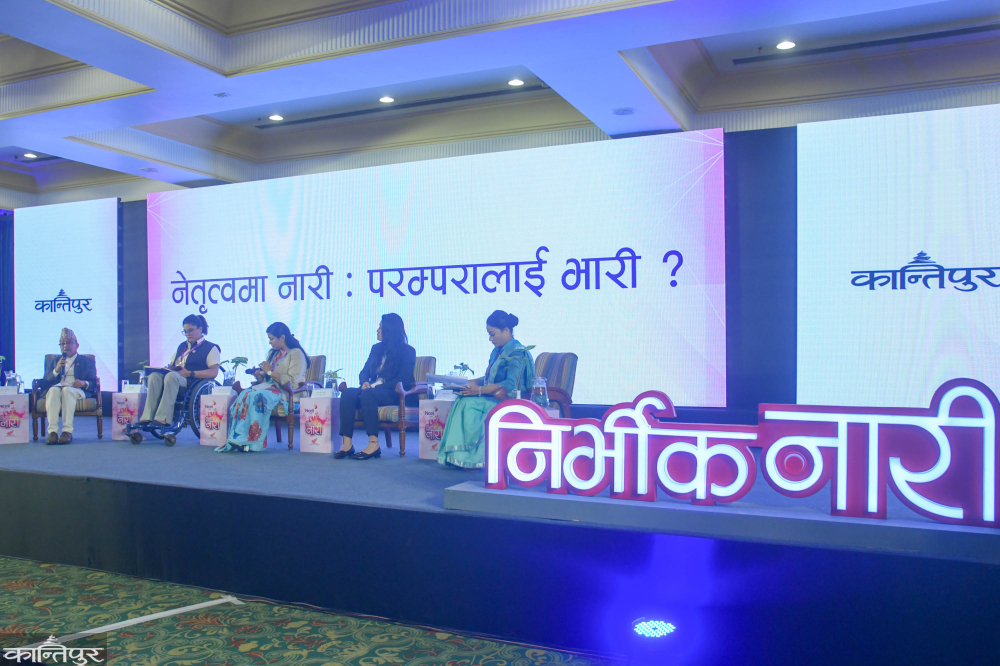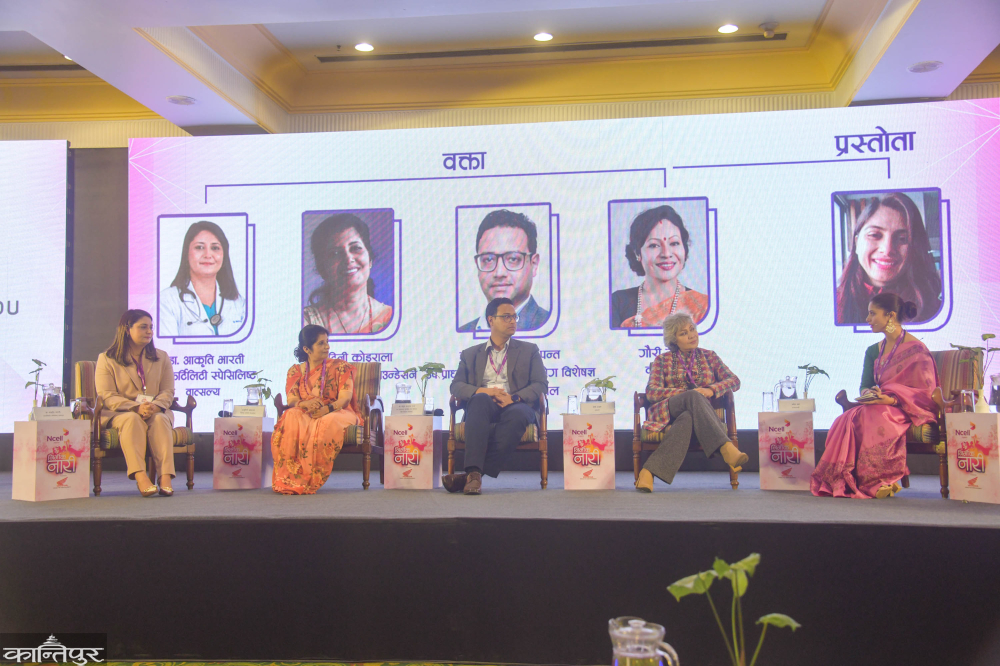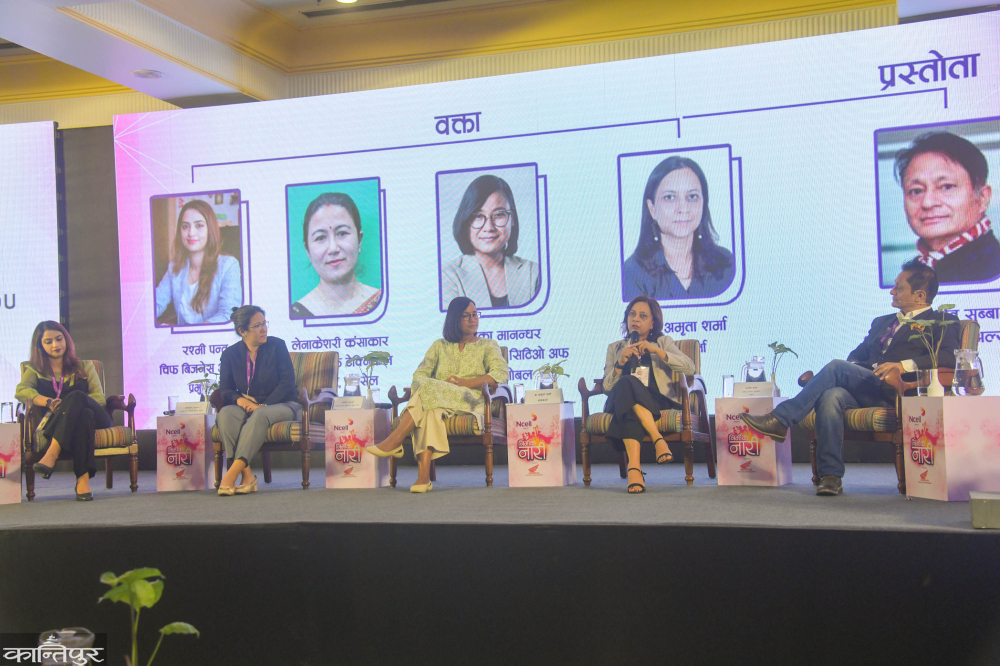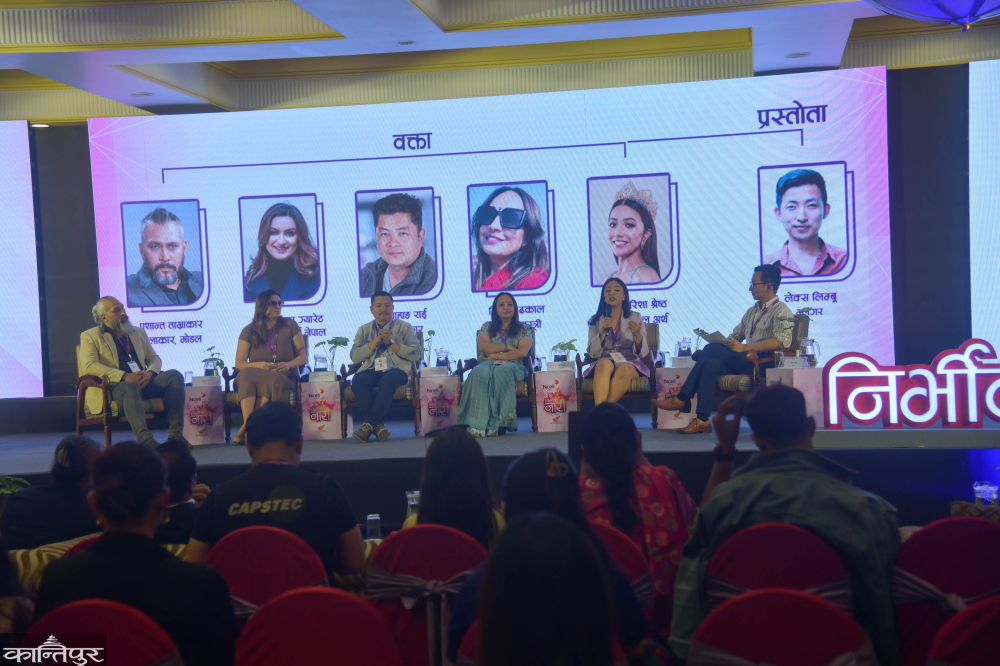Women in leadership: not just reservation, need for qualitative improvement

We use Google Cloud Translation Services. Google requires we provide the following disclaimer relating to use of this service:
This service may contain translations powered by Google. Google disclaims all warranties related to the translations, expressed or implied, including any warranties of accuracy, reliability, and any implied warranties of merchantability, fitness for a particular purpose, and noninfringement.

Highlights
- The fourth edition of Nirbhik Nari, a co-publication of Kantipur Publications Limited, Nari Masik, has been completed in Kathmandu on Thursday.



Stakeholders have said that in accordance with the essence of the constitution, women should be given the opportunity to demonstrate their ability to participate and provide leadership based on the principle of proportional inclusion in all state agencies. Most of the speakers who spoke in the first session of the 'Nirbhik Nari' program, 'Women in Leadership: Heavy on tradition?', gave this expression.

Chief Commissioner of Election Commission Dinesh Kumar Thapalia said that since elections are the most suitable and effective means to bring women into leadership and show courage, legal loopholes should be closed and opportunities should be created. "We should not talk about struggle, we should talk about reform," he said, "I wish the next generation would delete the word struggle, qualitative reform is the key." From the point of view of the election, Thapalia emphasized on giving opportunity to leadership as reform-oriented women's participation and leadership is heavy only for bad thinking, behavior, and values. "Women's leadership cannot be established by stretching the percentages that are determined by the constitution and laws as mandatory," he argued, "even though the number of women in the country is more than 400,000, the number of voters is less than that of men."
Former captain of women's cricket team Ruvina Chhetri Belwase said that the change should start with oneself. While leading the women's cricket team for 12 years, it was not possible to earn a living by playing cricket. "At that time, many people fled thinking that there is no future in this field, there was no choice but to think that I would bring some change," she said, "First of all, don't think that I am a woman, I am a person and with my hard work and perseverance, I have created a good platform. She gave her own example. When she was playing cricket, there was a lot of male dominance. Although her father was not there, she was supported by her mother. She said that she developed leadership skills from her mother. He complained that although the country is being recognized at the international level through sports, the government has not invested accordingly in the athletes.
Sunita Dangol, Deputy Mayor of Kathmandu Metropolitan City, said that leadership does not depend on gender but on the ability and principle of the individual. She complained that the constitution separates the responsibilities and powers of the head and deputy head of the local level, and although women have leadership ability, executive authority is given only to the mayor. "The constitution has prescribed rights and responsibilities. However, both the mayor and the deputy mayor will be elected by the people's votes,' she said, 'the fact that the deputy chief does not have executive powers is also a challenge.' Member and central member of Rashtriya Prajatantra Party Lakshmi Ghimire said. "Economically, it is a challenge for women to compete with men," she said, "for this reason, it is necessary to compete between women and women." "The main aspect of bringing women to the leadership level is finance and education," she said, "Only if we can do this, more women can come to leadership." This session was facilitated by Lakshmi Bhandari of Nari Masik.
 'Let's give birth to a child not by tax, but by desire'
'Let's give birth to a child not by tax, but by desire'
The second session of Nirbhik Nari's 'Motherhood churning', most of the speakers said that women are forced to give birth to a child by the tax and pressure of others rather than by their own desire. Infertility specialist Dr. Watsalyaki. Akriti Bharti, Director of Punyajan Foundation Kumudini Koirala, Associate Professor of Terti Teaching Hospital and Psychiatrist Dr. Sagun Ballabh Pant and artist Gauri Malla participated in the discussion of this session. Artist Gauri Malla said that there is a misconception about giving birth in Nepal. She said that women are forced to give birth to children for others. "It is important that a clean woman does not want to be a mother, she wants to give birth to a child not for others, but for herself," she said, "It is also important to know whether we can have a child mentally and financially."
family after marriage Kumudini Koirala, director of Punyajan Foundation, said that there is a situation where women have to bear a lot of pressure mentally to give birth. "Women have to suffer more humiliation than men because of not being able to give birth," she said, "social thinking and patriarchal thinking are showing women to be the culprit." He said that women should not be under pressure, but should have an environment to give birth with family support and help.
Mental problems are increasing when women give birth because of desire rather than desire. Sagunballabh Pant said. "Having children is a product of patriarchal thinking," he said. "Women are giving birth mentally and physically not ready to give birth," he said, "which is why women who have children are depressed, sad, fed up and suicidal when they come to the doctor."
 7 out of 10 people experience postpartum blues He informed. According to him, about 60 percent of mothers start experiencing depression, anxiety, and depression after two/three days of having a baby. This experience of women is medically known as postpartum blues or baby blues. He also said that studies have shown that one in 10 people in the world suffer from postpartum depression. According to small studies in Nepal, 1 out of 3 people have postpartum depression. He said that suicide is the main cause of death of women between the ages of 15 and 45 in Nepal and this problem is caused by not treating postpartum depression.
7 out of 10 people experience postpartum blues He informed. According to him, about 60 percent of mothers start experiencing depression, anxiety, and depression after two/three days of having a baby. This experience of women is medically known as postpartum blues or baby blues. He also said that studies have shown that one in 10 people in the world suffer from postpartum depression. According to small studies in Nepal, 1 out of 3 people have postpartum depression. He said that suicide is the main cause of death of women between the ages of 15 and 45 in Nepal and this problem is caused by not treating postpartum depression.
In a city like Kathmandu, Dr. still has a different view of women when they do not give birth. Aakriti Bharti said. She said that there is a discrimination that men marry a second time when they do not have children. She informed that recently, artificial insemination has increased in order to give birth to a healthy child after not having a child naturally. "Some women are not ready to give birth due to career, education, finances or health," she said, "egg freezing is appropriate for such women." This session was facilitated by journalist Sneha Jha.
Insignificant participation of women in leadership
Even though the information technology sector is flourishing, the participation of women is low, according to the participants of the third session of Nirbhik Nari's discussion program 'Suchana Tekshnikika Sarathi'. Prabhu Bank's Chief Business Officer Rashmi Pant said that while 45 percent of women participate in the banking sector, the overall technology sector is only 0.7 percent. She said that although the participation of women in the banking sector is 45 percent, it can be counted on the fingers at the leadership level.
'In the banking sector, 55 percent are men, only 11 percent are women at the branch level of the bank,' she said, 'When it comes to executives, you can count on your fingers.' . She said that there is no gender discrimination in the banking sector, but there are similar problems in this sector as in every sector.
The involvement of Nepali youth in the world market of information technology is spreading. Amrita Sharma said. She said that the government should play its role in the promotion and protection of skilled manpower in the field of information technology by enacting timely laws. "Our 66,000 youth are working independently in the world market of information technology," she said, "work is always connected with meaning, only those who pass Plus Two and work at the entry level are earning 50,000 on average." Sonika Manandhar, End CTO of Alloy Global emphasized that one should not be afraid to practice any new idea. "You shouldn't be afraid to practice new ideas, and you shouldn't be afraid that someone will copy them," she said, "If it's easy for someone to copy them, don't assume it wasn't a special idea." She also informed that the app has been made targeting the women of Veg. "Because technology is making it more difficult for them to be comfortable, we have developed technology so that technology should be accessible to everyone. which can be used by every female entrepreneur,' she said, 'Technology should be user-friendly.' He said that the opportunities and future in the field of information technology are also good because of the easy and good income to study in IT and engineering colleges. She informed that along with policy arrangements to increase women's participation in the IT sector, women themselves should also be aware.
 The keynote speaker of the third session was Garrett E., Head of the Press and Cultural Branch of the American Embassy. Wilkerson said that Nepali women's contribution to the economy is exemplary. He said that in the past 77 years, America has created opportunities for Nepali women by collaborating with the Nepalese government, citizens, and private sectors. "In cooperation with the government of Nepal, we have worked on the empowerment of one million Nepali women," he said, "we have been cooperating in the education, business, business, leadership capacity development and technology development of Nepali women." Garrett said. The session was facilitated by Sanjeev Subba, President of Fintech Alliance Nepal.
The keynote speaker of the third session was Garrett E., Head of the Press and Cultural Branch of the American Embassy. Wilkerson said that Nepali women's contribution to the economy is exemplary. He said that in the past 77 years, America has created opportunities for Nepali women by collaborating with the Nepalese government, citizens, and private sectors. "In cooperation with the government of Nepal, we have worked on the empowerment of one million Nepali women," he said, "we have been cooperating in the education, business, business, leadership capacity development and technology development of Nepali women." Garrett said. The session was facilitated by Sanjeev Subba, President of Fintech Alliance Nepal.
The measurement of beauty is changing
Most of the speakers of the fourth session 'Meaning of Beauty' discussed the fact that the definition of beauty is changing recently. Artist and model Prashant Tamrakar, Jane Deepika Garrett of Miss Universe Nepal 2023, artist Dayahang Rai, sociologist Nirmala Dhakal, Miss Nepal Earth 2022 Dr. Sarisha Shrestha was the participant.
'Recently, the definition of beauty standards has been widening,' said model and artist Tamrakar, 'Earlier there was a common understanding that beauty was considered to be within the standard of beauty.' Smile, eyes, body and mind also. He said that beauty represents society, country, culture and youth.
Sociologist Nirmala Dhakal said that living one's life by understanding society's mind cannot be compromised. "You should be able to ignore irrelevant things while living as a person who is different from the social structure and society's view," she said, "The measure of beauty is also changing according to place and time." He said that many standards of beauty, including the shy nature taught by common books, stories, and novels, are changing.
Miss Universe Nepal 2023' Jane Deepika Garrett said that the wrong perception of beauty standards can be removed through education. "Every person is different, they look different. I don't know how the standards of beauty came to exist in our society, where a person has to look a certain way. This is a toxic mindset, people do surgery with this mindset. They try to change themselves.' Garrett also said that she is sending a message through social media about the misunderstanding of beauty standards. "Everybody who is different looks different from social media," she said, "They are beautiful and should be accepted." Sarisha Shrestha said. "Beauty Pageant should be seen as an opportunity to learn more than just measuring beauty," she said. The producer advised him not to act.
'In the beginning, they even said that you are not good for acting,' he said. Artist Dayahang, who is becoming a 'super hit' in the Nepali film industry recently, said that even now some people ask the same question. "I have come this far because I went ahead and said that I will do what I like," he said, "When I started my film career, I thought that I needed a type of person in the frame." Vlogger Lex Limbo played the role of facilitating this session.

 प्रकाशित : चैत्र ३०, २०८० ०६:५९
प्रकाशित : चैत्र ३०, २०८० ०६:५९

 २२.१२°C काठमाडौं
२२.१२°C काठमाडौं











